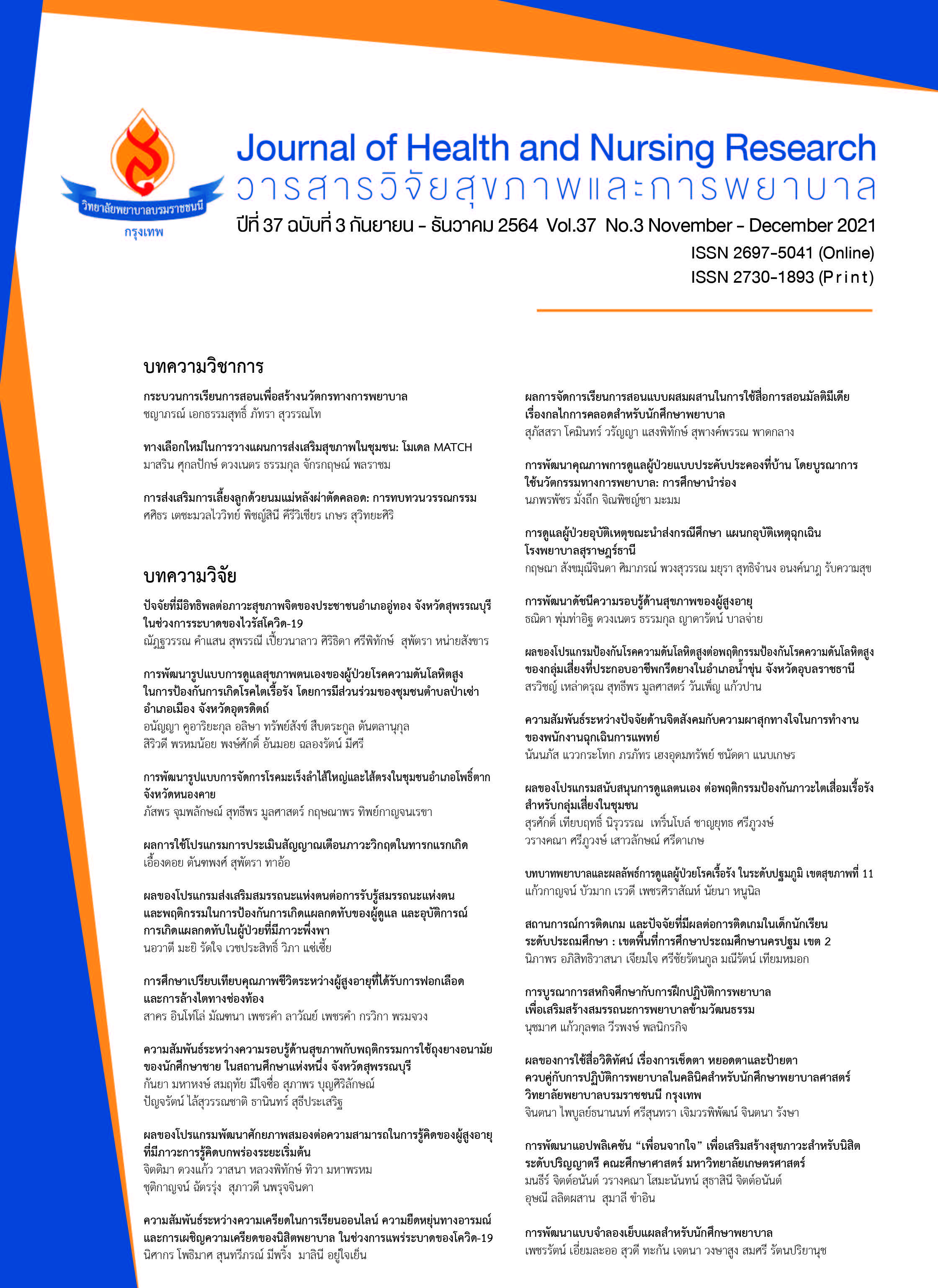ความสัมพันธ์ระหว่างความเครียดในการเรียนออนไลน์ ความยืดหยุ่นทางอารมณ์ และการเผชิญความเครียดของนิสิตพยาบาล ในช่วงการแพร่ระบาดของโควิด-19
คำสำคัญ:
ความเครียดในการเรียนออนไลน์, ความยืดหยุ่นทางอารมณ์, การเผชิญความเครียด, นิสิตพยาบาลบทคัดย่อ
บทนำ: ในช่วงการแพร่ระบาดของโรคโควิด-19 ทำให้จำเป็นต้องจัดการเรียนการสอนแบบออนไลน์ เพื่อพัฒนาการเรียนรู้ให้กับนิสิตพยาบาล ซึ่งการเปลี่ยนแปลงดังกล่าวส่งผลให้นิสิตต้องปรับตัวและอาจมีความเครียดได้ วัตถุประสงค์การวิจัย: เพื่อศึกษาความสัมพันธ์ระหว่างความเครียดในการเรียนออนไลน์ ความยืดหยุ่นทางอารมณ์ และการเผชิญความเครียดของนิสิตพยาบาล ในช่วงการแพร่ระบาดของโรคโควิด-19 ระเบียบวิธีวิจัย: กลุ่มตัวอย่างเป็นนิสิตพยาบาลที่กำลังศึกษาระดับชั้นปีที่ 3 และปีที่ 4 จำนวน 169 คน เลือกกลุ่มตัวอย่างโดยการสุ่มอย่างง่าย เครื่องมือวิจัยแบ่งเป็น 4 ส่วน ได้แก่ แบบสอบถามข้อมูลส่วนบุคคล แบบวัดความเครียดในการเรียนออนไลน์ แบบประเมินพลังสุขภาพจิต (Resilience Quotient: RQ) และแบบวัดการเผชิญความเครียด วิเคราะห์ข้อมูลโดยใช้สถิติเชิงพรรณนา และสหสัมพันธ์ของเพียร์สัน ผลการวิจัย: กลุ่มตัวอย่างมีความเครียดในการเรียนออนไลน์อยู่ในระดับสูงและรุนแรง (ร้อยละ 45.60 และ 36.10 ตามลำดับ) มีการเผชิญความเครียดอยู่ในระดับปานกลาง ร้อยละ 83.40 และมีความยืดหยุ่นทางอารมณ์อยู่ในระดับปกติ ผลการวิเคราะห์ความสัมพันธ์พบว่า ความยืดหยุ่นทางอารมณ์มีความสัมพันธ์ทางลบกับความเครียดในการเรียนออนไลน์ (r = -.27, p< .01) และมีความสัมพันธ์ทางบวกกับการเผชิญความเครียด (r = .16, p< .05) สรุปผล: นิสิตพยาบาลมีความเครียดในการเรียนออนไลน์อยู่ในระดับสูงถึงรุนแรง และความยืดหยุ่นทางอารมณ์เป็นปัจจัยสำคัญที่เกี่ยวข้องกับความเครียดในการเรียนออนไลน์และการเผชิญความเครียด ข้อเสนอแนะ: ควรนำเสนอหรือเผยแพร่ผลการวิจัยให้กับผู้บริหารสถานศึกษาและผู้ที่เกี่ยวข้อง เพื่อนำผลการวิจัยไปพัฒนาแนวปฏิบัติในการเฝ้าระวังนิสิตที่มีความเครียดในระดับสูงและรุนแรง รวมถึงออกแบบการเรียนการสอนออนไลน์เพื่อให้นิสิตมีความเครียดลดลง
Downloads
เอกสารอ้างอิง
Department of Disease Control. COVID-19 situation, vigilant measures against the spread of Coronavirus (COVID-19), problem and obstacle to prevent and disease control for travelers. [internet]. 2021 (cited 2021 September 3); Available from: https://ddc.moph.go.th/uploads/files/2017420210820025238.pdf
Ministry of Education. Announcement of Ministry of Education. [internet]. 2020 (cited 2021 September 3); Available from: https://moe360.blog/2020/03/17/ศธ-สั่งสถานศึกษาทั่วประ/
Law Division Naresuan University. Announcement of Naresuan University on online instruction and examination management. Naresuan University; 2020. (in Thai).
Yaribeygi H, Panahi Y, Sahraei H, Johnston TP, Sahebkar A. The impact of stress: a review. EXCLI Journal 2017;16:1057-72.
The University of Arizona. The effects of stress on college students & way to overcome it. [internet]. 2021 (cited 2021 September 3); Available from: https://www.uagc.edu/blog/the-effects-of-stress-on-college-students-ways-to-overcome-it
Prasertsong C, Sanghirunruttana J, Kladkaew P. The factor related to stress of online learning due to the COVID-19 situation among nursing students. J Somdet Chaopraya Inst Psychiat 2021;15(1):14-28.
Lazarus RS, Folkman S. Stress, Appraisal and Coping. New York: Springer; 1984.
Intarakamhang U. Research Synthesis Concerning the Stress and Coping of Thai People. [internet]. 2008 (cited 2021 September 3); Available from: http://bsris.swu.ac.th/upload/115.pdf
Sahu M, Gandhi S, Sharma MK, Marimuthu P. Perceived stress and resilience and their relation with the use of the mobile phone among nursing students. Invest Educ Enferm 2019;37(3):1-9. doi: 10.17533/udea.iee.v37n3e05.
Furman M, Joseph N, Miller-Perrin C. Associations between coping strategies, perceived stress, and health indicators. Psi Chi J. Psychol. Res 2018;23(1):61-71.
Kaneko S, Momino K. Stress factors and coping behaviors in nursing students during fundamental clinical training in Japan. Int J Nurs Clin Pract 2015;2:138. doi: 10.15344/2394-4978/2015/138.
Department of Mental Health. Change the bad to good, the power of mental health, RQ: Resilience quotient (4th ed.). Nonthaburi: Beyond publishing; 2020. (in Thai).
Kietchaiyakorn T. Relationship between adversity and resilience quotient and stress of a secondary school students [Master thesis]. Chiang Mai University; 2011. (in Thai).
Panchatree S. Effect of the resilience enhancement program on stress of students preparing for university admission examination [Master thesis]. Chiang Mai University; 2008. (in Thai).
Jornburom Y. Effect of the resilience enhancement program on reduced stress of students secondary school. J Nurs Divis 2017;44(1):103-15. (in Thai).
Yamane T. Statistic: an introductory analysis (2nd ed.). New York: Harper & Row; 1970.
Srisatidnarakul B. The methodology in nursing research (4th ed.). Bangkok: You & I intermedia; 2007. (in Thai).
Mahatnirunkul S, Pumpaisalchai W, Tapanya P. The construction of Suan Prung Stress Test for Thai population. Bulletin of Suanprung 1997;13(3):1-20. (in Thai).
Burns N, Grove SK. The practice of nursing research: appraisal, synthesis, and generation of evidence (6th ed.). St. Loius: W.B. Saunders; 2009.
Wangkhoklang S. Study of relationship between stress and coping stress of public health undergraduate students in Faculty of Public Health and Health technology at Nakhornratchasima college [Master thesis]. Srinakharinwirot University; 2011. (in Thai).
Mheidly N, Fares MY, Fares J. Coping with stress and burnout associated with telecommunication and online learning. Front Public Health 2020;8:1-7. doi:10.3389/fpubh.2020.574969.
Oducado RMF, Estoque HV. Online learning in nursing education during the COVID-19 pandemic: stress, satisfaction, and academic performance. J Nurs Pract 2021;4(2):143-53.
Besser A, Flett GL, Zeigler-Hill V. Adaptability to a sudden transition to online learning during the COVID-19 pandemic: understanding the challenges for Students. Scholarsh Teach Learn Psychol 2020;1-21. doi:10.1037/stl0000198.
Malik M, Javed S. Perceived stress among university students in Oman during COVID-19-induced e-learning. Middle East Curr Psychiatry 2021;28(1):49. doi: 10.1186/s43045-021-00131-7.
Guillasper JN, Oducado RMF, Soriano GP. Protective role of resilience on COVID-19 impact on the quality of life of nursing students in the Philippines. Belitung Nurs J 2021;7(1);43-9.
Sarmiento ÁS, Ponce RS, Bertolín AG. Resilience and COVID-19: an analysis in university students during confinement. Educ Sci 2021;11:533. doi:10.3390/educsci11090533.
Wongprach B. Factors related to stress and coping stress of nursing students in the Royal Thai Army Nursing College. JRTAN 2018;19(2):201-10. (in Thai).
Ye Z, Yang X, Zeng C, Wang Y, Shen Z, Li X, Lin D. Resilience, social support, and coping as mediators between COVID-19-related stressful experiences and acute stress disorder among college students in China. Appl. Psychol. Health Well-Being 2020;12(4):1074-94.
Morales-Rodríguez FM. Fear, stress, resilience and coping strategies during COVID-19 in Spanish University Students. Sustainability 2021;13(1):5824. doi:10.3390/su13115824.
ดาวน์โหลด
เผยแพร่แล้ว
รูปแบบการอ้างอิง
ฉบับ
ประเภทบทความ
สัญญาอนุญาต
บทความที่ได้รับการตีพิมพ์ เป็นลิขสิทธิ์ของวารสารวิจัยสุขภาพและการพยาบาล (วิทยาลัยพยาบาลบรมราชชนนี กรุงเทพ) ไม่สามารถนำไปตีพิมพ์ซ้ำในวารสารฉบับอื่น


















